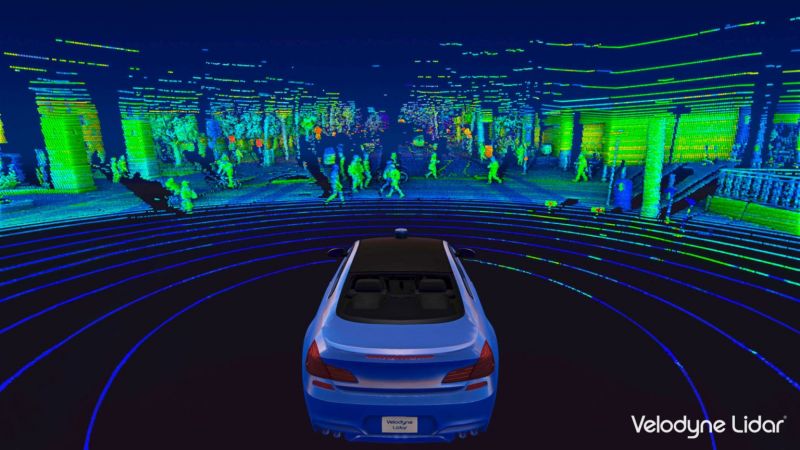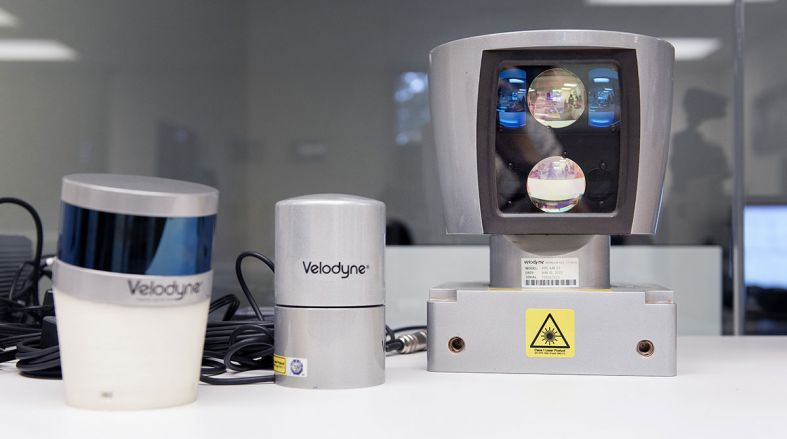Velodyne Lidar Removes its Founder as Chairman Following Internal Investigation
【Summary】San Jose, California-based lidar developer Velodyne Lidar Inc., one of the most well known lidar companies in Silicon Valley, has removed its founder David Hall as Chairman following an internal investigation. Also removed from her position as marketing chief was Hall’s wife Marta Thoma Hall. The investigation surrounds their dealings with the board and company practices, Reuters reported.

San Jose, California-based lidar developer Velodyne Lidar Inc. which is one of the most well known lidar companies in Silicon Valley, has removed its founder David Hall as Chairman following an internal investigation. Also removed from her position as Velodyne marketing chief was Hall's wife Marta Thoma Hall.
The investigation surrounds their dealings with the board and company practices, Reuters reported.
"The investigation concluded that Mr. Hall and Ms. Hall each behaved inappropriately with regard to board and company processes, and failed to operate with respect, honesty, integrity, and candor in their dealings with company officers and directors," the company said in a statement.
Velodyne said on Monday it had also received a notice from David and Marta Thoma Hall of their intent to nominate one candidate for a seat on the board.
The news sent Velodyne's stock price down nearly 10% on Monday to $19.08. The company's stock is listed on the NASDAQ under the symbol "VLDR."
Dr. Joseph B. Culkin, PhD, was named as Chairman of the Board, replacing Mr. Hall, while Sally Frykman was appointed Chief Marketing Officer replacing Hall's wife.
"We are pleased to have someone of Sally Frykman's caliber take on the important and additional role of Chief Marketing Officer," said Dr. Anand Gopalan, PhD, Chief Executive Officer of Velodyne. "Sally was instrumental in leading our communications efforts around our ongoing public processes. We are confident that her expertise in managing public relations and digital marketing will prove invaluable as we continue to execute on our strategic plan to deliver strong and disciplined growth."
Velodyne's founder David Hall invented real-time 360-degree lidar systems back in 2005. Since then its become an essential sensor used by self-driving vehicles to navigate. The laser technology is also used in advanced driver assist systems (ADAS) such as Automatic Emergency Braking (AEB) and Adaptive Cruise Control (ACC).
David Hall is the company's largest shareholder with a 35.43% stake as of Feb. 12, according to Refinitiv IBES data. Hall's wife owns a 3.74% stake in the company.
Ford Motor Co was an early backer of Velodyne, but the automaker dissolved its 7.6% stake in the company just last week, but did not give a reason. Ford owned over 13 million shares of the company.
Velodyne made headlines in Sept 2020 when the company went public following a merger with a special purpose acquisition company (SPAC) Graf Industrial Corp (GRAF).
Last week, GRAF CEO James Graf, stepped down from Velodyne's board. However Graf's decision to resign was not due to any disagreement with the company, Velodyne had said in a filing.
Silicon Valley-based Velodyne was one of the first companies to supply lidar to developers of autonomous vehicles. The company supplied the lidar for Google's self-driving car project beginning in 2009. At the time, the lidar units were bulky mechanical devices, resembling a spinning bucket on the roof of Google's first self-driving vehicles.
Velodyne's newest systems however feature much more advanced solid state lidar technology, with no moving parts, which are much more reliable for use in the auto industry.
Velodyne has over 300 customers, including major automotive OEMs and leading tech companies developing perception technologies for self-driving vehicles, autonomous shuttles and ADAS, including lidar products for autonomous delivery vehicles that carry goods rather than people.
In Nov 2020, Velodyne unveiled its latest solid-state lidar sensor designed to support advanced driver assist systems (ADAS) as well as autonomous driving. The sensor is called the Velarray H800.
The solid state Velarray H800 is designed for automotive grade performance and built using Velodyne's proprietary micro-lidar array architecture (MLA). It's targeted at automakers and OEMs.
The Velarray H800 can detect objects up to 200 meters away, which is enough distance to bring a vehicle to a complete stop if an object is in its path, even at highway speeds. The lidar supports ADAS and autonomous driving from Level 2 to Level 5, according to Velodyne.

Velodyne is a major supplier of lidar sensors to developers of self-driving vehicles.
Last October, Velodyne announced a three-year lidar supply deal with China's Baidu, a company that's often referred to as the "Google of China."
Baidu is launching a robo taxi service in China called "Apollo Go" as part of its Apollo open-source autonomous driving platform. As part of the supply agreement, Baidu's fleet of self-driving vehicles will use lidar sensors from Velodyne.
Baidu Apollo said it selected the Alpha Prime lidar for its range, resolution and field of view that collectively address the high-performance requirements for Baidu's autonomous vehicles.
Velodyne was founded in 1983 as Velodyne Acoustics, a speaker company building subwoofers. However the company switched focus to become a pioneer in the development of lidar, which is an acronym for "light detection and ranging."
The technology works by bouncing pulses of laser light off of objects and measuring the time its takes for the beams to reflect back to the sensor. The reflected light creates a 3D image of a self-driving vehicle's surroundings, including buildings, trees and other vehicles.
Lidar also works well in rain, snow and low light conditions, unlike camera-based perception systems like Tesla's Autopilot. Lidar has become an essential piece of hardware for developers of self-driving vehicles. By measuring time-of-flight, distance of objects can also be measured with lidar.
In July 2019, Velodyne announced the acquisition of high-definition mapping and localization software company Mapper.ai. The deal included the intellectual property assets from the San Francisco-based startup.
Mapper.ai specializes in creating custom, high-definition maps for its clients working on developing advanced driver assist systems (ADAS) using lidar technology.
With its acquisition of Mapper.ai, Velodyne has moved into the software space, developing ADAS systems that incorporate lidar technology.
-


Ford is Testing a New Robotic Charging Station to Assist Drivers of EVs With Disabilities
-


Ford Raises the Prices of the F-150 Lightning Electric Pickup Due to Rising Raw Material Costs
-


The BMW 7-Series to Feature HD Live Maps From HERE Technologies for Hands-Free Highway Driving in North America at Speeds up to 80 MPH
-


AutoX to Use the 'Eyeonic Vision Sensor' from California-based SiLC Technologies for its Robotaxi Fleet in China
-


LG Develops ‘Invisible’ Speaker Sound Technology That Could Revolutionize In-Vehicle Audio
-


Researchers at South Korea’s Chung-Ang University Develop a ‘Meta-Reinforcement’ Machine Learning Algorithm for Traffic Lights to Improve Vehicle Throughput
-


Zeekr’s New 009 Electric Passenger Van is the World’s First EV to Feature CATL’s Advanced ‘Qilin’ Battery With a Range of 510 Miles
-


Redwood Materials is Building an Electric Vehicle Battery Recycling Facility in South Carolina
- China's Tech Giant Baidu Plans to Rollout the World’s Largest Fully Autonomous Ride-Hailing Service by Next Year
- General Motors is Building a Coast-to-Coast DC Fast EV Charging Network in the U.S. in a New Partnership with Travel Center Operator Pilot Company
- GM Offering to Buy Out Buick Dealers That Don’t Want to Sell EVs
- EV Brand Polestar Announces $1.6 Billion in New Financing as its Stock Price Falls Below $5
- EV Startup VinFast is Offering 3 Years of Free EV Charging and Advanced Driver Assist System for Customers That Reserve a Vehicle Through Sept 30
- Drivers of 2010-2018 Lexus Vehicles Lose Vehicle Connectivity Services Due to The Recent Shutdown of 3G Cellular Networks
- General Motors Announces a Key North American Nickel Supply Deal for Electric Vehicle Batteries
- Toyota is Working With the U.S. Dept of Energy to Advance ‘Megawatt-Scale’ Fuel Cell Powered Stationary Energy Generators
- Premium Chinese EV Brand Zeekr Seeks to Raise $1 Billion in U.S. IPO, According to Sources
- Mercedes-Benz is Offering a Performance Upgrade as a Yearly Subscription on its EQ Electric Vehicles











 About Us
About Us Contact Us
Contact Us Careers
Careers